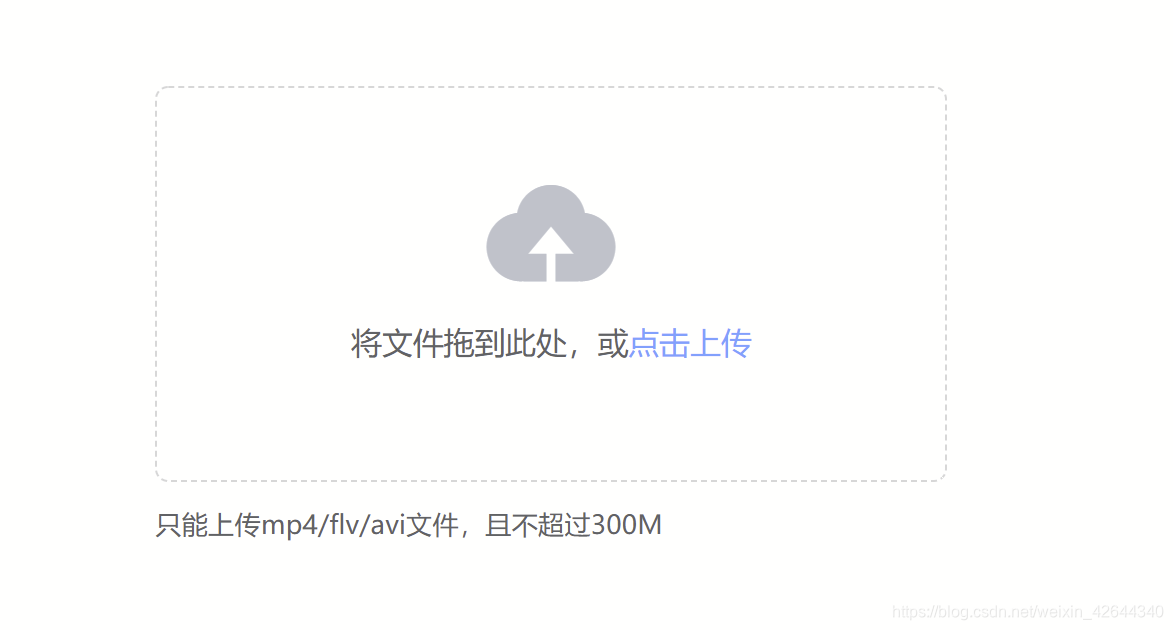Vue+Spring Boot使用ElementUI el-upload实现视频带参数上传(前后端代码详解)
前言
在百度上看到很多博主谈起Element UI el-upload大多都是对官网已有内容进行搬运,也仅限前端实现,无后端操作,更无扩展性讲解,千篇一律,枯燥无用,因此今天我给大家讲些有用的,如何实现前端带参数上传视频并接收后端返回的保存路径,后端接收保存前端上传视频并返回保存路径。至于Element UI如何引用,如果你还不会的话,请移步至
Element UI官网
。
Vue实现带参数视频上传
这里先解释下el-upload组件的几个参数含义:
drag: 是否有拖拽框
action:前后端交互的接口
data:上传所带的参数
on-success:文件上传成功时的钩子
before-upload:上传文件之前的钩子,参数为上传的文件
on-progress:文件上传时的钩子
<template>
<div class="test2">
<el-upload style="margin-left:14%;margin-top:5%"
class="avatar-uploader el-upload--text"
:drag="{Plus}"
action="http://localhost:8443/api/uploadVidoe3"
multiple
:show-file-list="false"
:data="{SavePath: this.Path.url}"
:on-success="handleVideoSuccess"
:before-upload="beforeUploadVideo"
:on-progress="uploadVideoProcess">
<i v-if="Plus" class="el-icon-upload"></i>
<div v-if="Plus" class="el-upload__text">将文件拖到此处,或<em>点击上传</em></div>
<el-progress v-if="videoFlag == true" type="circle" :percentage="videoUploadPercent" style="margin-top:30px;"></el-progress>
<div class="el-upload__tip" slot="tip">只能上传mp4/flv/avi文件,且不超过300M</div>
</el-upload>
</div>
</template>
<script>
export default {
name: 'test2',
data () {
return {
videoForm: {
videoId: '',
videoUrl: ''
},
videoFlag: false,
Plus: true,
Path: {
url: 'F:/video/videoUpload'
},
videoUploadPercent: 0
}
},
mounted: function () {
},
methods: {
// 视频上传前执行
beforeUploadVideo (file) {
const isLt300M = file.size / 1024 / 1024 < 300
if (['video/mp4', 'video/ogg', 'video/flv', 'video/avi', 'video/wmv', 'video/rmvb'].indexOf(file.type) === -1) {
this.$message.error('请上传正确的视频格式')
return false
}
if (!isLt300M) {
this.$message.error('上传视频大小不能超过300MB哦!')
return false
}
},
// 视频上传过程中执行
uploadVideoProcess (event, file, fileList) {
this.Plus = false
this.videoFlag = true
this.videoUploadPercent = file.percentage.toFixed(0)
},
// 视频上传成功是执行
handleVideoSuccess (res, file) {
this.Plus = false
this.videoUploadPercent = 100
console.log(res)
// 如果为200代表视频保存成功
if (res.resCode === '200') {
// 接收视频传回来的名称和保存地址
// 至于怎么使用看你啦~
this.videoForm.videoId = res.newVidoeName
this.videoForm.videoUrl = res.VideoUrl
this.$message.success('视频上传成功!')
} else {
this.$message.error('视频上传失败,请重新上传!')
}
}
}
}
</script>
Spring Boot接收参数并保存视频
@PostMapping(value = “/api/uploadVidoe3”) 这里接口与前端保持一致
//导包
import java.io.File;
import java.util.*;
import org.springframework.web.bind.annotation.*;
import org.springframework.web.multipart.MultipartFile;
import org.springframework.beans.factory.annotation.Value;
import org.springframework.stereotype.Controller;
//实现接收的方法
@CrossOrigin
@PostMapping(value = "/api/uploadVidoe3")
@ResponseBody
public Map<String,String> savaVideotest(@RequestParam("file") MultipartFile file,@RequestParam String SavePath)
throws IllegalStateException {
Map<String,String> resultMap = new HashMap<>();
try{
//获取文件后缀,因此此后端代码可接收一切文件,上传格式前端限定
String fileExt = file.getOriginalFilename().substring(file.getOriginalFilename().lastIndexOf(".") + 1)
.toLowerCase();
// 重构文件名称
System.out.println("前端传递的保存路径:"+SavePath);
String pikId = UUID.randomUUID().toString().replaceAll("-", "");
String newVidoeName = pikId + "." + fileExt;
System.out.println("重构文件名防止上传同名文件:"+newVidoeName);
//保存视频
File fileSave = new File(SavePath, newVidoeName);
file.transferTo(fileSave);
//构造Map将视频信息返回给前端
//视频名称重构后的名称
resultMap.put("newVidoeName",newVidoeName);
//正确保存视频则设置返回码为200
resultMap.put("resCode","200");
//返回视频保存路径
resultMap.put("VideoUrl",SavePath + "/" + newVidoeName);
return resultMap;
}catch (Exception e){
e.printStackTrace();
e.getMessage();
//保存视频错误则设置返回码为400
resultMap.put("resCode","400");
return resultMap ;
}
}
如果你想限制上传大小,在spring boot主程序中添加下面的文件上传配置
import org.springframework.boot.SpringApplication;
import org.springframework.boot.autoconfigure.SpringBootApplication;
import org.springframework.boot.web.servlet.MultipartConfigFactory;
import org.springframework.context.annotation.Bean;
import org.springframework.util.unit.DataSize;
import javax.servlet.MultipartConfigElement;
@SpringBootApplication
public class WuwenjunApplication {
public static void main(String[] args) {
SpringApplication.run(WuwenjunApplication.class, args);
}
/**
* 文件上传配置
* @return
*/
@Bean
public MultipartConfigElement multipartConfigElement() {
MultipartConfigFactory factory = new MultipartConfigFactory();
//单个文件最大
factory.setMaxFileSize(DataSize.parse("400MB")); //KB,MB
/// 设置总上传数据总大小
factory.setMaxRequestSize(DataSize.parse("400MB"));
return factory.createMultipartConfig();
}
}
实现效果
视频上传前Vue前端

视频上传中Vue前端

视频上传成功后Vue前端

前端收到后端返回值为

视频上传成功后Spring Boot后端

上传结果

以上就是这期《Vue+Spring Boot使用ElementUI el-upload实现视频带参数上传(前后端代码详解)》的全部内容了。
版权声明:本文为weixin_42644340原创文章,遵循 CC 4.0 BY-SA 版权协议,转载请附上原文出处链接和本声明。